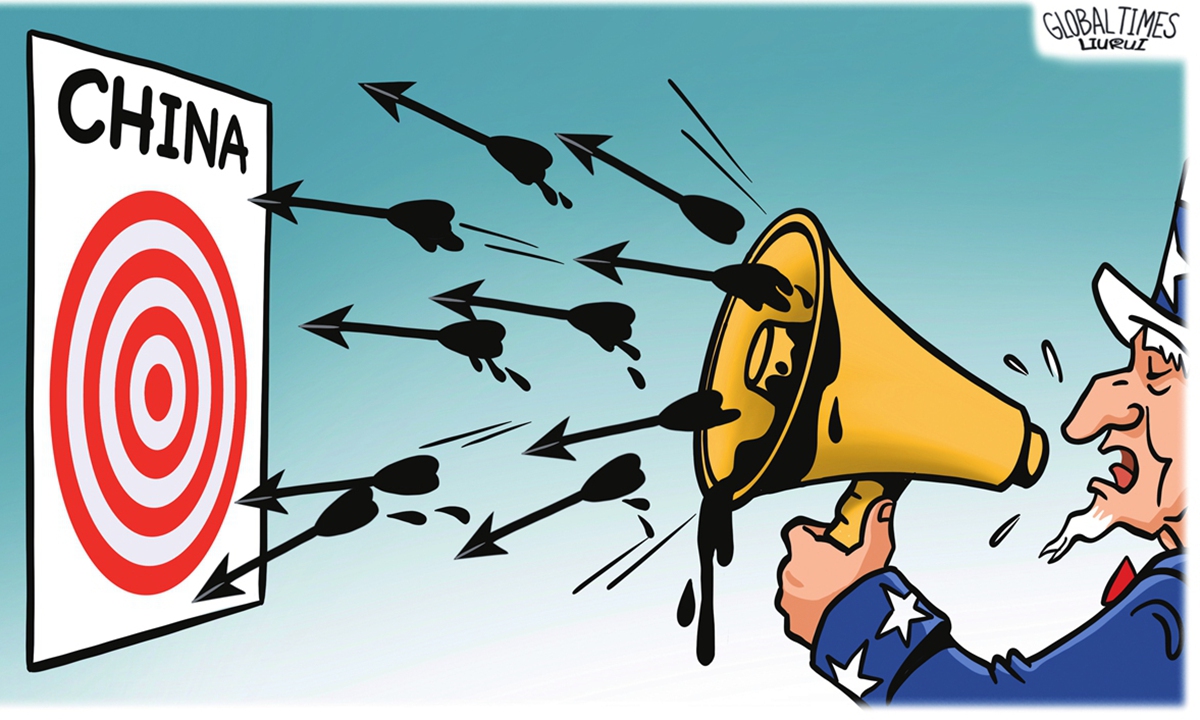
The hopeless fault-finder Illustration: Liu Rui/GT
American political elite's rhetoric about China is increasingly incendiary. A bipartisan consensus has emerged that frames China as a "threat" to the US and its global status. A millenarian frame activates a war-like posture, in which politicians seek to out-muscle each other on who's the "toughest on China."
For the American political elite, China was a subject to be saved or vanquished. That's the way with millenarian politics in which a God-ordained exceptionalism energizes its missionary zeal.
To be saved, China had to be changed, transformed and molded. When China didn't meet American expectations, the US elite could only see China as an adversary. This is, for many in the American elite, a "spiritual war."
How are we to understand the US' framing of, and posture toward, China? To a large extent, though by no means the only reason, US contemporary attitude toward China draws from a deep political-cultural well, in which the US is positioned as the bastion of humanity and history's civilizational march.
A missionary zealotry is a golden thread that can be found woven throughout American attitudes and approaches to China over the past more than 150 years. For the most part, China and its people were to be saved spiritually, through the work of missionaries. Only when the savior mission appears to be foundered on the rocks of an implacable communist polity did we witness a volte-face: no longer could China be saved; it must be vanquished instead.
On both facets, the American elite's framing of China can be understood in terms of "spiritual warfare."
The dissolution of the Soviet Union in 1991 saw sections of the American political elite declare victory. Who could forget Francis Fukuyama's premature "end of History" claim? In a position of geopolitical dominance, the US embarked on its proselytizing of civilization with American characteristics through a combination of military interventions and enforced economic reforms in various parts of the world.
By the mid-1990s, the American political elite were inclined to rekindle the ambition of saving China, this time not through the work of religious missionaries per se, but via the transformative potential of economic neoliberalism.
Against the judgment of others, the Bill Clinton administration successfully argued for the admission of China to the World Trade Organization (WTO). At the time, accession to the WTO was understood to be pivotal to transforming China politically and culturally.
By 2017, this ambition was abandoned. The 2017 National Security Strategy (NSS) declared China aims to supplant the US in the "Indo-Pacific Region" and transform the regional order in China's favor. No other NSS has described China in such categorically confrontational terms.
As the NSS made clear, China could no longer be "saved." It was to be classified as an "economic and military threat." In a special issue of Foreign Affairs magazine in 2018, leading figures in the American foreign policy establishment lamented the failure of the efforts to transform and save China from communism.
A form of "buyer's regret" set in. The posture rapidly turned from disappointment that Beijing had "defied" Washington's expectations, as political elite Kurt Campbell and Ely Ratner lamented in March 2018, to one of confrontational hostility. Current National Security Advisory, Jake Sullivan, confirmed as much in remarks delivered in January 2024, in which he acknowledged that the US had for decades sought to change and shape China. However, these efforts had failed. China had refused to bow down to the US, and Washington could no longer tolerate this, let alone accommodate China as a peer.
China itself rejects the entire framing. China's political leadership refuses to see the world in such simplistic Manichean terms and does not subscribe to the notion of great power competition. Rather, through such frameworks as those advanced by the Global Civilization Initiative, the Chinese approach to framing global order sees the world in more diverse, co-existential terms. "Planet Earth is big enough for the two countries to succeed, and one country's success is an opportunity for the other," said the Chinese leader, in remarks that contrast with the American zero-sum mentality.
The author is adjunct professor at Queensland University of Technology, senior fellow at Beijing Taihe Institute, and former policy advisor to Kevin Rudd. opinion@globaltimes.com.cn

